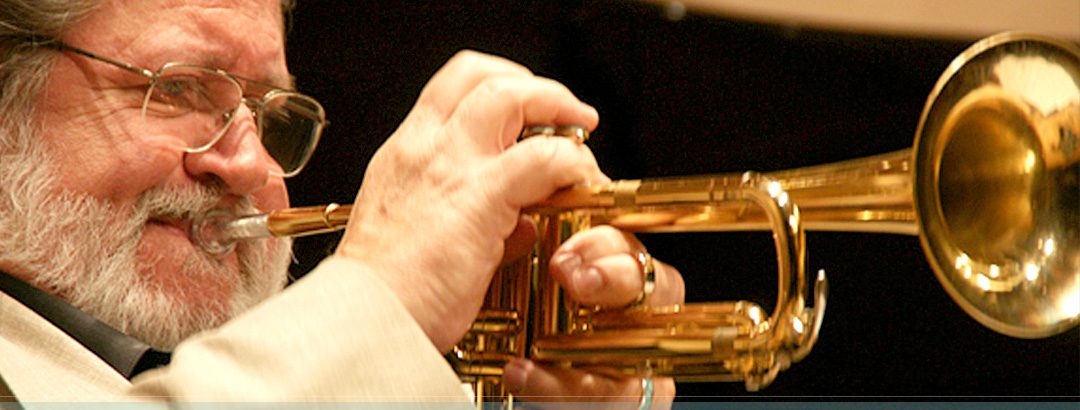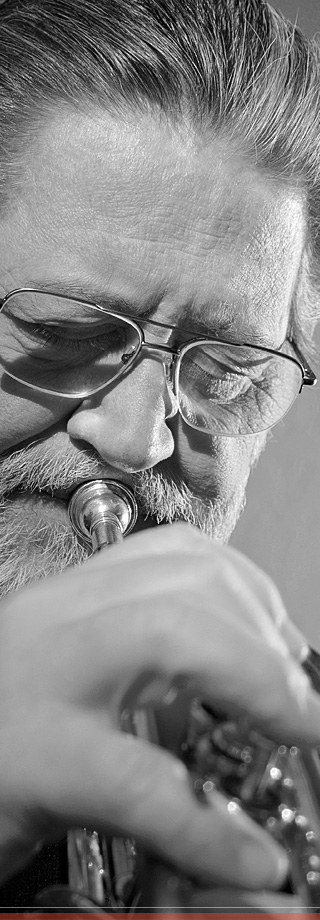
Bobby Shew
New Mexico Music Hall Of Famer, Recording Artist & Educator
Mr. Shew was born in Albuquerque, New Mexico. He began playing the guitar at the age of eight and switched to trumpet at ten. By the time he was thirteen, he was playing at local dances with a number of bands. By fifteen, had put together his own group to play in jazz coffee houses. He spent most of his high school nights playing at a dinner club, giving him an early start to his professional career.
He spent three years as the jazz trumpet soloist in the famed NORAD multi-service band. Shortly after leaving, he joined the Tommy Dorsey Orchestra which gave him the chance to perform with trumpet legend Charlie Shavers. After his stint with Tommy Dorsey, Bobby was asked to play with Woody Herman’s band. He then spent some time playing for Della Reese and Buddy Rich.
In 1972, he decided to make a move to the Los Angeles area in order to develop his skills as a jazz player. There he spent time with the groups of Art Pepper, Bud Shank, Horace Silver and Frank Strazzeri-Sam Most, as well as big bands such as Bill Holman, Louie Bellson, Toshiko Akiyoshi-Lew Tabackin, Oliver Nelson, Bill Berry, Nat Pierce-Frank Capp Juggernaut, Ed Shaughnessy, Terry Gibbs, Benny Goodman, Maynard Ferguson, Neal Hefti, Don Menza and Bob Florence.
During this time, Bobby also found a great deal of studio work, including TV shows like Hawaii 5-O, Streets of San Francisco, Bob Newhart, Mary Tyler Moore, Midnight Specials, Happy Days, Laverne and Shirley and Eight is Enough. His work on soundtracks includes Grease I and II, Rocky I and II, Six-Pack, The Muppet Movie, The Drivers and Taxi. He has even held a few minor acting roles in movies and TV shows.
In addition to a busy performing and private teaching schedule, Bobby spends a considerable amount of time actively involved in the educational system, conducting clinics and master classes all over the world. Bobby has been an artist-in-residency all over the world.
For additional information please visit:
– http://bobbyshew.com
Bobby Shew With The Louie Bellson Band Playing Blue
The Art Of Jazz Improvisation According To Jazz Legend Bobby Shew
Why did you choose music as your career?
I was studying to be either an architect or a commercial artist but got drafted into the Army. Luckily, I auditioned for and was accepted into the newly formed NORAD Band. I spent three years touring with them and during that last few months was asked to audition for the Tommy Dorsey band. They offered me the job and I never looked back. But the real answer has to do with the fact that the music almost chose ME. I have always had a deep passion for improvising because of its touching upon spontaneity in being creative. It is THIS that has kept my passion at an extremely high level of dedication to not only playing but to teaching as well.
Where you classically trained then switched to jazz and commercial music?
Not really any classical training other than just playing in school band material. I started improvising at age 12 and played my first gig at that age. I never had any lessons nor did I have books such as Arban, Clarke, etc. I mostly learned just by listening to recordings and any live concerts that I could hear locally.
On days when you are not performing or rehearsing how long do you practice for?
Depending upon how you define practicing, my answer might shock you. I DO NOT sit in a room and play scales, etudes, or even “jam with Jamey” very much. My biggest concern is in maintaining the muscle tone in the embouchure muscles as well as keeping my setting of the mouthpiece connected. I DO keep several trumpets and flugelhorns sitting openly in various places around my home and studio and I occasionally pick one up and play it for a few minutes. Sometimes it’s for 3-4 minutes and sometimes 15-20. I probably play anywhere from 5-12 times a day but almost never for very long periods. And, when running errands I flutter the facial muscles for blood supply and do a fair amount of isometric lip/free buzzing for muscle tone.
What do you mostly work on when at home practicing?
Weaknesses in my playing. I very seldom play things I am comfortable with except for those few “fun moments” when I just like to “cut myself loose” from problem solving. Trying to play with ease in ALL KEYS is a major issue so I’ll often take a standard tune thru all 12 keys.
How long where you studying/playing jazz before your solos started sounding cohesive and professional?
For whatever reason, I was able to sound pretty good right away. I was fortunate to have been born with a very naturally good sense of internal time and a pretty good relative pitch ear. I could hear a tune and play it back within just a few moments. And referring to the internal “time”, I never had to count bars so much because I could always FEEL the pulse of the bass and drums and the phrases.
What kind of scales and patterns do you practice?
Almost NONE. I don’t want my playing to sound scalar or patterned so I pretty much avoid them.
When you are improvising are you thinking about scales or are you simply playing melodies and ideas that are playing in your head?
Always… the goal is to PLAY WHAT YOU HEAR! And what we hear is probably 90% what we REMEMBER! This means that listening is extremely vital STILL. I buy LOTS of CDs and DVDs and try to keep up with the newcomers on the scene. But, I always go back to my earliest influences such as Don Fagerquist, Chet Baker, Kenny Dorham, Miles, Clifford, Conte Candoli, Sam Noto, Benny Bailey, etc. The list goes way further and includes non-trumpeters as well.
When soloing, do you have the chord changes memorized or do you simply have an idea of shapes and colors of the tune?
Depending upon how well I am familiar with the tune, it changes. When learning a newer tune, I work my way through the chords very precisely with inversions, scales, common tone and voice leading drills. THEN, I set that material aside and see what I hear on those changes, always trying to find linear lines and melodies.
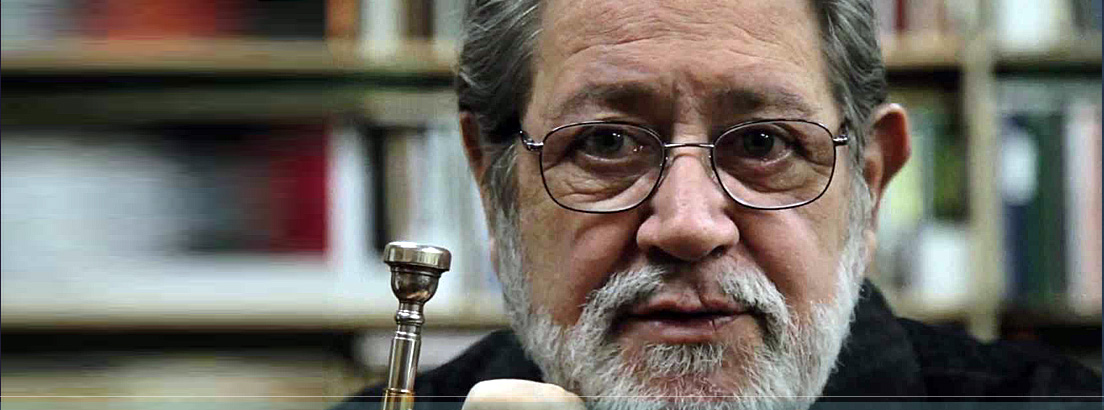
Are you normally not really concerned with the actual chord changes?
If I know the tune, I never think of chord changes but rather just hear the SOUND of the tune and hope to hear new melodic lines that fit on top of those chordal sounds. When I was in Horace Silver’s Quintet in the early 80’s (following the heavy shoes of Tom Harrell), I learned some great lessons from Horace about “forgetting the chords and finding the new melodies.” That is the way he wrote tunes, too!
Do you write some ideas for the solo before heading to the studio?
NEVER!!! That goes totally AGAINST honest improvisation.
Do you prefer to play with your own band or with other groups?
Both. The advantages of my own band are that we KNOW EACH OTHER and it adds a sense of predictability and confidence in what and how we play. But, I ALSO love to experience the wonders of playing with someone new and learning from THEIR ideas. I was extremely fortunate to have been able to play with a great many of the true legendary players and there is NOTHING to compare with THAT experience. Standouts were Dizzy, James Moody, Phil Woods, Al Cohn, Red Rodney, Blue Mitchell, Red Holloway, Teddy Edwards, McCoy Tyner, Bill Evans (sax), Bud Shank, Charles McPherson, Art Farmer, and may more. I’m still “pinching myself” to make certain it wasn’t just a dream!!!
Do you approach your playing any different if you are playing with your big band as opposed to as a soloist in somebody else’s group?
No. I have only my own voice and that is where I reside. Granted, bits and pieces of my influential players drift in and out of “my voice” at times but that’s really because they were influential, I guess. It’s a waste of time and a poor representation of integrity to TRY to play a certain way, especially in order to impress or please them. There is no greater enemy to artistic integrity than THAT, in my opinion.
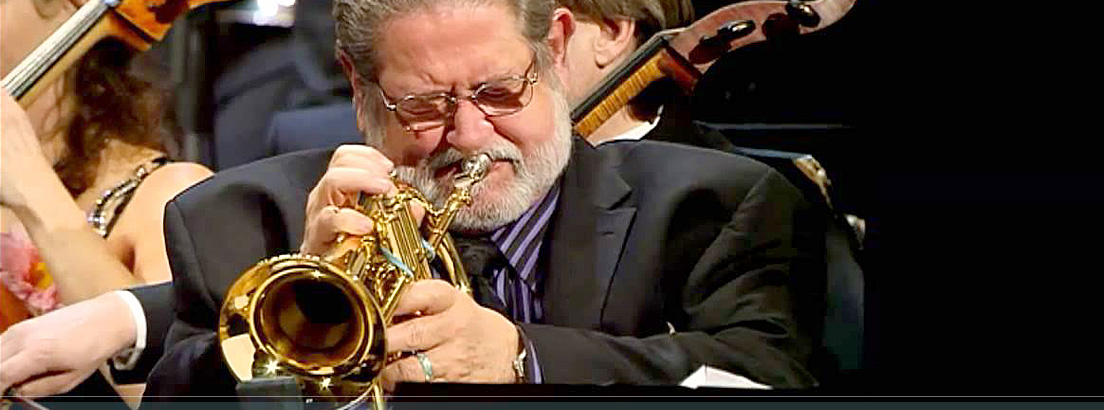
Who do you listen to for inspiration?
Almost everyone I CAN!
Do you enjoy teaching or do you prefer to be out recording and playing instead?
Playing always takes precedence but I am a very dedicated teacher and I love doing that, trying to help players succeed.
I have been concentrating as much as I possibly CAN on sticking close to the SCIENCE of the body (Anatomy-Physiology) and the equipment (Acoustics-Physics). We ALL need to know exactly HOW THE MECHANICS WORK when we play. I try to “separate fact from opinion.” There has been a LOT of opinionated info passed on as factual when it is NOT. And it can really mess up a players hopes for a decent future by trying to operate under falsehoods. Opinions are fine to have because they give us individuality. Preferring one food over another is fine but don’t try to convince your friends (and students) that one food is superior. It’s a matter of personal opinion. Passing on false data as to equipment, ho to practice, etc., can ruin a future.
When recording, do you go for the first solo or do you do a few takes of the solo until you are happy with the result?
I prefer to do at least 2 solos on each track to just sit back and compare. I DON’T like to play TOO MANY solos because it gets anti-creative after a while. I feel like I am TRYING to play well and that never works in a positive way.
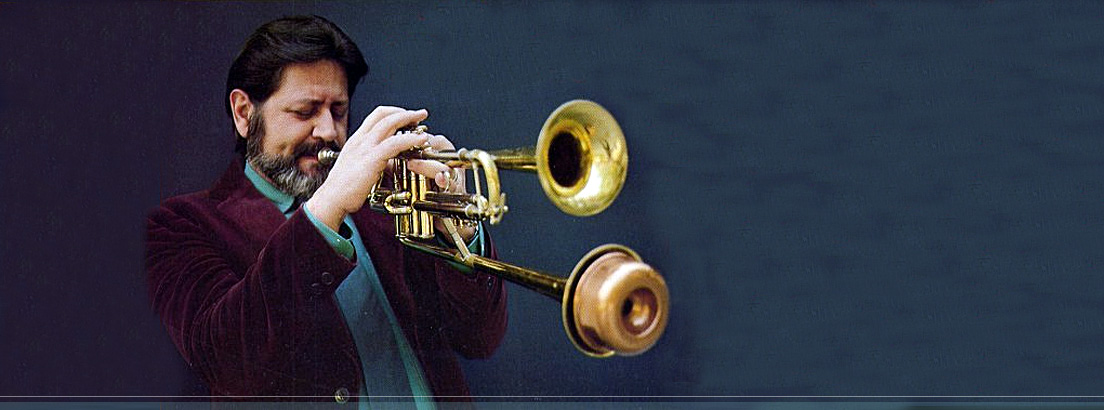
What equipment are you currently playing?
The Bobby Shew Model 8310Z YAMAHA trumpet and Bobby Shew Model 8310Z Flugelhorn. I occasionally play a YAMAHA 2335 Cornet as well. And I play the SHEW lead and jazz mouthpieces by YAMAHA and in SOME intimate circumstances, I play the Shew Jazz piece by Kelly Mouthpieces in Lexan.
Do you select different equipment depending on the group or what the job calls for?
Absolutely, YES! I recall reading in a book many years ago that a vital aspect of SANITY is being able to know how to select the right tool for the job at hand. Trying to play LEAD on a deep classical type of mouthpiece is asking for trouble or failure. Not very smart.
How much time and effort do you put into composing?
It varies but not much really. I have moments where lines burst froth and if I like the line, I will write it down or play it several times to “lock it in” and see if it’s something I want to retain.
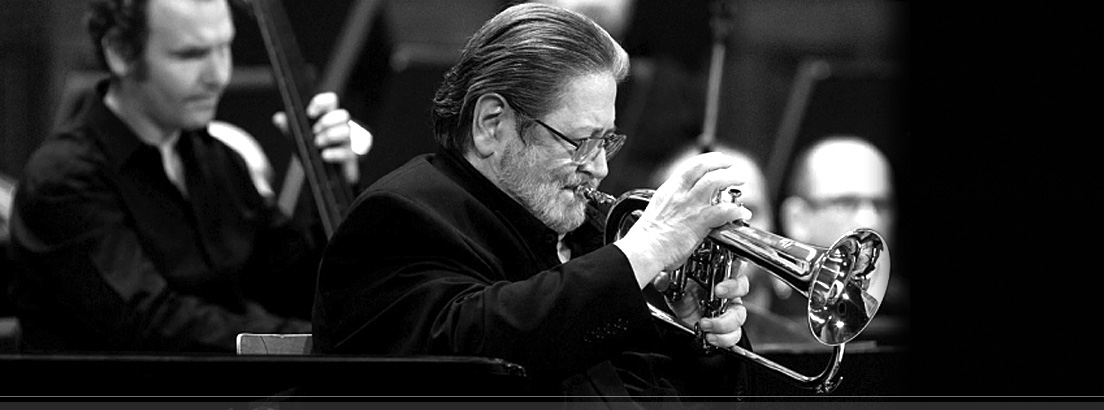
When composing do you work out a progression then a melody or does the melody come first?
Melody always first.
Do you have a formula you follow when working on new compositions?
No really. But pretty much all of the tunes I have written over the years have had some special MEANING behind them rather than just some uninspired line. Some people write very well that way but it has never been so easy for me. I seem to need the inspiration and that is almost ALWAYS a PERSON, usually a musician I have worked with or looked up to, I have written tunes for Blue Mitchell, Don Menza, Chuck Findley, Bob Malone, Chuck Piscatello (owner of Carmelo’s jazz club in LA), Kenny Dorham, etc. The inspiration from these people always provided the conceptual energy that brought the melody to the surface.
Do you do the arrangements for your own compositions or do you delegate that to someone else?
I do them myself because it makes me fulfill the full concept of how I want the tune presented initially.
Of all your compositions, is there one that is your all-time favorite?
Either BLUE of NADALIN.
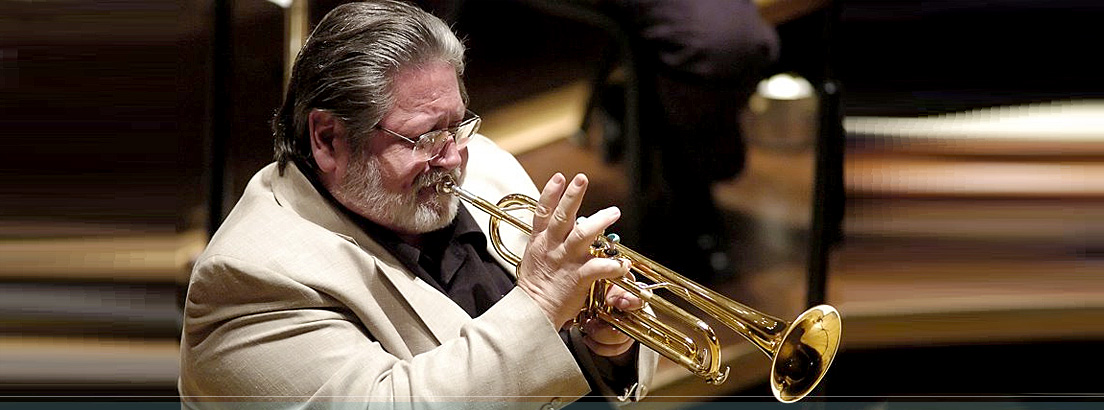
How much time and effort did it take you to complete your latest album?
Two days of recording, one day of adding strings and two days of mixing.
Now that you are an established soloist, what is your biggest career challenge?
Staying alive!!!
Serious music students use your solos as part of their learning tools, how do you feel about that?
It depends upon their true intention. To play from a written page without actually HEARING the solo would be a less rewarding action. When you hear, you get the articulations, the rhythmic feel, the dynamic changes, etc., all of which help you establish a closer connection to how you must get connected to these factors in your own playing. Of course, I am very flattered that someone would think that a solo of mine was worthy of transcribing and studying. It has been done and it is humbling, to say the least. There are so many great players to check out and many have been transcribed into book, i.e. Dizzy, Miles, Rodney, Mitchell, Harrell, Freddie, the list goes ON!
Did you ever imagine your solos would have such an impact on others?
NEVER!
Best advice you would give to an upcoming player?
Listen, listen, listen. DO NOT be unwilling to go far back and hear the early players such as Louis Armstrong, Bix, Berigan, Teagarden, Eldridge, Dizzy, Lester Young, etc. It helps to understand the broad history of this art form. It does NOT mean that you have to copy Armstrong but when you listen to him and realize the time period he lived and performed in, without so many advances in horn production and mouthpiece shops on every corner, it makes you appreciate his determination to develop the music from stage one.
Best tip for anyone learning the art of improvisation?
As I said before, listening and getting yourself on the bandstand and DOING IT! You can ONLY IMPROVE. No one gets worse by playing frequently.
Bobby Shew’s Solo on Minuano (6/8)
From The Music of Pat Metheny and Lyle Mays’ by Bob Curnow’s L.A. Big Band
